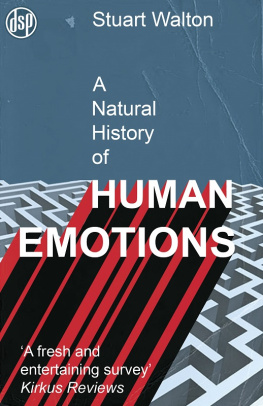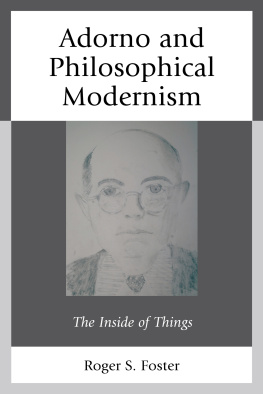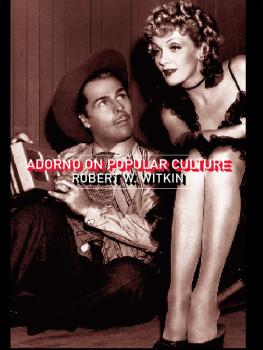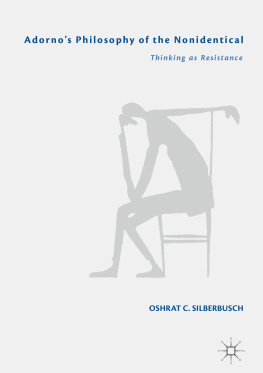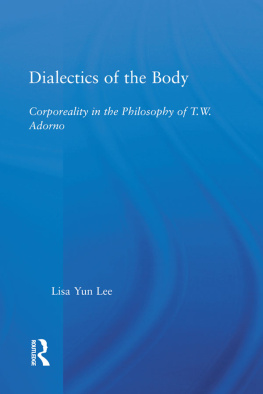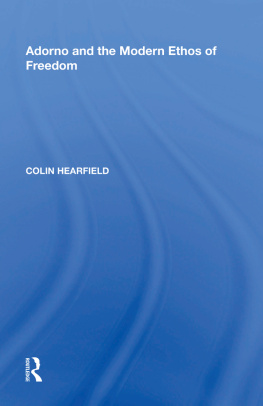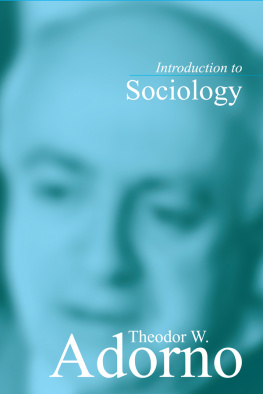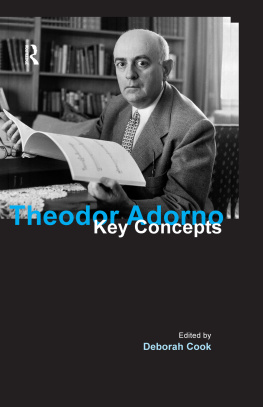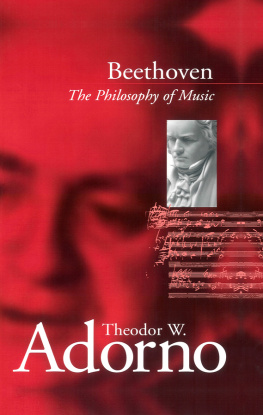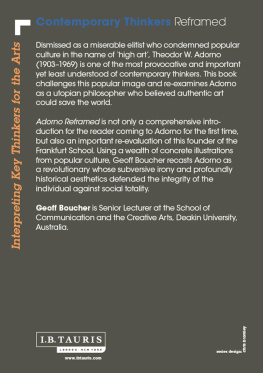CONTENTS
For Laurence Coupe
One
Society and the Individual
Within repressive society the individuals emancipation not only benefits but damages him. Freedom from society robs him of the strength for freedom. For however real he may be in his relations to others, he is, considered absolutely, a mere abstraction.
Minima Moralia
In February 2014, targeted advertising and the communications systems that enable it achieved another significant advance in their capabilities, when it was announced that a pair of satellite television companies in the United States had joined forces to offer to clients a newly developed package called Addressable TV.assuring them that they will target them with only such advertisements as they are interested in seeing. When social media websites that allow users to reject particular ads then ask them what it was that they didnt like about them, the options never include the right to say that they dont like advertising. Anybody objecting that they dont wish advertising to be aimed at them at all, at whatever degree of personal specificity, is viewed by the industry as a recalcitrant dissident who must be brought to heel, and by broadband providers and media companies as a foolish puritan who wilfully refuses to appreciate that the services he is enjoying must be bought not just by his subscription, but also by his dutiful attention to the commercial propaganda of the companies own clients. Those who do not wish to comply can invest in an online ad-blocker, or press the Mute button on the remote control every time the TV ad-breaks begin, but the onus, which may well be a financial one in itself, has shifted to the intended recipient of advertising to try to escape it, where once it fell on the advertiser to solicit his attention. A powerful distillate of contemporary experience might be the Internet user being interrupted while trying to read the news by being made to look at targeted ads for ad-blockers.
To the Adorno who wrote, with Max Horkheimer, in Dialectic of Enlightenment (1947) that in late capitalist consumer culture, something is provided for everyone so that none may escape, nothing about targeted advertising would have seemed unfamiliar. What it is predicated on is the shameless mendacity that its potential recipients are individuals. The emphases of this circumstance have undoubtedly shifted in the seventy years since Adorno and Horkheimer wrote. If it seemed the case in the 1940s that a one-size-fits-all approach conformed the culture industrys clients into one amorphous mass, training them to react in the same ways to the emotional and ideological stimuli of mass entertainments, such as popular music radio stations and the productions of Hollywood, the present practice is very much for constituting them as a collective of individuals, each with his or her own respective tastes, inclinations and interests, which are courteously acknowledged by the system so that it might speak more personally to each of them, but for the greater concealed purpose of bringing them into line with other participants in the consumer economy. A pretence to a belief in the preciousness of individuality was only a belated accrual on the balance-sheet of capitalist economic relations, which had otherwise relegated it to the status of a sundry item, except where it served the self-image of entrepreneurialism. If business ventures themselves were allegedly always started by far-seeing innovators with the imaginative energy and resources to get them off the ground, their potential clients were an indistinguishable mass, amalgamated into the sum-totals on the asset side. What peoples individual preferences might be were once their own affair, as long as one of their preferences turned out to be for the entrepreneurs wares. Now capitalism in its globalised phase is keen to know everything it can about them, partly because gigantic corporate entities have so many different products and services they might sell them, but also because flattering them that they are individuals is thought to be the best way of bringing them into the commercial fold. The concept of individuality, excoriated as a personal tenet in the form of bourgeois individualism in the era of revolutionary collective subjects, endured as a stance of libertarian defiance on the western flank of the Cold War divide, since the demise of which it has become transformed from a hardened pig-headedness into a gentler insistence on universal mutual respect, but is no less ideology for that. Indeed, inasmuch as its assumptions largely pass unnoticed, it is arguably more ideological than ever, because a society that would crumble to bits if individuals were allowed the full measure of their constitutional gains hardly has the interests of individuals at heart. It was the insight of Marx that economic relations at the nascent monopolistic stage of capitalist development had taken on the lineaments of primitive anthropology, one that subordinated consciousness to revered fetish-objects invested with mystical significance, a mechanism that members of the Frankfurt School would argue in the following century had extended from the economic relations of production to the overall structure of society itself and the cultural forms it has historically generated. To understand this thought-process, it is necessary to turn back to the opening chapter of the Dialectic of Enlightenment, on The Concept of Enlightenment, to see how the most formidable critique of western civilisation mounted in the twentieth century, and perhaps in the entire Marxist tradition, came to view the fate of the individual in mass society.
The narrative structure within which Adorno and Horkheimer frame their argument about the progress of enlightenment is a circular one, in which human history has coiled back on itself like the narrative of Finnegans Wake. This is not to say that a technological society has literally regressed to prehistoric conditions, but that the context into which consciousness has been led by the progress of rationality bears elements of the thought-forms of the age of primal fear. The circularity of this process lies in the fact that mythological thinking, by which the terrors of the natural world were attributed to gods, contained within itself the seeds of the enlightenment towards which it strove, which then, as enlightenment became the total context of the quest for scientific knowledge and understanding in the eighteenth century, began to revert to the monolithic nature of myth in the form of the unquestioned and changeless objectivity that science took as its ideal. As the authors succinctly put it: Just as the myths already realise enlightenment, so enlightenment with every step becomes more deeply engulfed in mythology. Sovereignty over the objective constitutes everything there is as an undifferentiated mass, in that every element is equally susceptible to rational inquiry, which respects the distinctions between phenomena only in order that, by subsuming them to the force of reason, they may be homogenised. The raw material of the myths were the occurrences of the natural world, of what was experienced as sheer contingency in human affairs, subjected to a categorising and ordering principle, in which narrative form they prepared the compartmentalisation of knowledge into which the universities would eventually organise it. Mythology was humankinds way of telling itself what it needed to know, but instead of liberating thought from the entanglement of blind conceptual domination, enlightenment only enmeshed it further in real domination by making the mastery of nature simultaneously the principle of social organisation. In this sense, the Frankfurt School turned Hegels notion of human history as an incremental progress in the consciousness of freedom against itself, so that the purely abstract freedom that Hegel saw in the Greek city-states reverts to worldwide domination, rather than developing towards the concrete freedom that he thought had been imperfectly realised in his own time.


